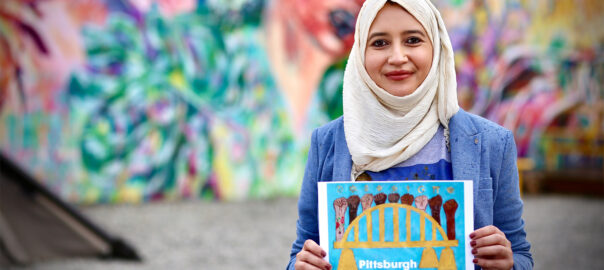Pittsburg, Pennsylvania is the home of 446 bridges, more than any other city in the world. The City of Bridges is also home to a small group of Muslims, only about 0.5% of the population. Maybe this minority status contributed to the 2018 attack on a high school Muslim woman wearing a hijab. This violence is one reason Ebtehal Badawi began her “Pittsburg Builds Bridges” art project.
Even though she herself is a Muslim, Ms. Badawi’s bridge paintings depict symbols of nine various religions and cultures demonstrating a wide range of different worldviews. She believes, as I do, that differences need not divide us. Our diversity can make us stronger, kinder, and wiser if we will ground ourselves in the basic truth of our common humanity.
“The reason these things happen, incidents of racism and bullying, is because people are afraid of people who are different,” said Ms. Badawi. “We need to accept those who are different, people who don’t look the same or share the same belief. We need to be open, to see the people in front of us.”
We need to see the people in front of us.
This is where bridges come in handy.
Bridges bring us nearer to one another, connecting those who may have been separated by distance or terrain, by experience or opinions. When we make the effort to find ways to move closer, then we are able to see, hear, and understand more clearly.
Some years ago, I attended an event called Dallas Dinner Table, a conversation of strangers around a shared meal on Martin Luther King Jr.’s birthday. The bridges of understanding we built together during that evening made us all stronger, kinder, and wiser.
When I served as a local pastor in several different congregations, we would create occasional opportunities for church friends with diverse (and sometimes clashing) opinions to sit down together and tell their stories. Strengthening relationships, cultivating mutual respect, and appreciating the context of our various lives often allowed us to find a path through our disagreements.
Living Room Conversations broadens the opportunity to build bridges of community across cyberspace. Even when we are separated by multiple miles and numerous time zones, we get to “see the people in front of us,” hear their stories, and understand viewpoints that are different from our own.
But why would any of us do this bridge building work when it’s so very comfortable to stay safely within our own familiar territory? Ms. Badawi reminds us that violence is the price societies will pay when we allow ourselves to be fragmented and cut off from each other. Fear of “the other” will foster violence in thought, word, or deed in small and large ways. On the other hand, drawing near to another allows us to see the other, to recognize our shared humanity, and (hopefully) to find there insight instead of fear.
Like my Muslim sister, as a Christian, I too ground my peacemaking efforts in my own religious faith. We both acknowledge that there are too many ways in which our various faith traditions have been misused to divide people instead of bringing people together, to foster animosity instead of cultivating love. We reject these kinds of misappropriations and we will do whatever we can wherever we are to encourage our neighbors to break down barriers and to build bridges in their place.
I am grateful for the ways the Bridge Alliance effort is always seeking creative partners in this bridge building business. Maybe you too are making similar efforts where you live. Maybe you see others in your community reaching out across divides. What you see where you are? Where do you find hope, courage, and wisdom in the midst of the challenges of our day?
Where are your bridges?
For more information about Ebtehal Badawi, see the article “I never thought it would be a campaign: Muslim artist’s work uses art to build bridges” by Katherine Post. Published by Religion News Service, September 7, 2021. Also see this YouTube interview on City Channel Pittsburg.
Photo credit: Emmai Alaquiva
Charlotte Vaughan Coyle is the author of the newly released book Living in The Story: A Year to Read the Bible and Ponder God’s Story of Love and Grace (available at Wipf and Stock publishers and Kindle.

Thank you, Charlotte for sharing this young woman’s story. It is refreshing to see someone use compassion for a response to prejudice/bigotry. Most prejudice is based on fear and learned from family and friends. However, as ever, there are those who promote it for their own gain whether financial or political control. Divide and conquer, historically a military tactic, has been adopted by those with non-civil and non-religious good will. Being able to recognize the culprits for what they are and deny them the control they seek can move us forward to a more peaceful humanity. They are attempting to deny us the normal tools we might normally use against their efforts (our Constitution is a good example as well as misrepresentations of various religions). Spreading awareness that there is are healing methods to resist the attempts at destruction of our real powers is vital to our success.